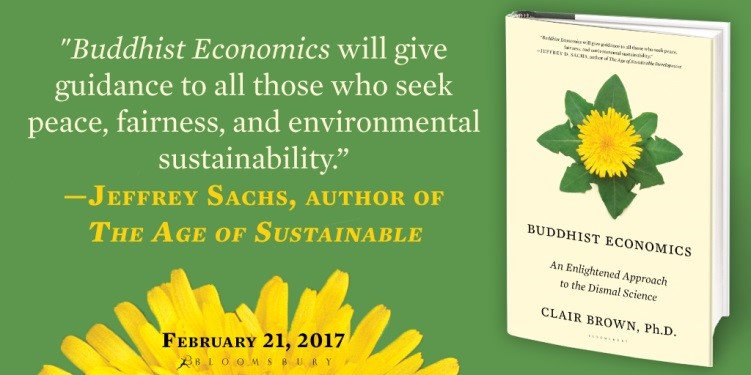ABOUT THE BOOK
You want to do more for the planet and for people in need, but don’t know what to do. Climate change and inequality seem complicated with no easy answers, and we’re all short of time and energy. In Buddhist Economics: An Enlightened Approach to the Dismal Science, UC Berkeley economist Clair Brown shows how we can create an economic system that works for all of us and cares for Mother Earth. She makes economics understandable, and even fun, with novel ways of thinking about how to combine policies and technology to create the economy we want. In the book, she shows us how to do this with an eight-step program. Buddhist Economics shows how we can create a modern economy that supports the human spirit and the earth.
DISCUSSION GUIDE
- In Buddhist Economics, happiness comes from living a worthy life and helping others, instead of seeking immediate pleasure (Chapter 2). In the past few days, what have you done that made you happy? Did you notice what created enduring happiness?
- In Buddhist Economics, our true self (human spirit, soul) is kind and altruistic. But we can lose awareness of our human spirit in today’s materialistic, dog-eat-dog world. (Chapter 3). What did you do recently to be in touch with your kind and altruistic self?
- Did Buddhist Economics help you to understand the critical problem of climate change? (Chapter 4) Did it inspire you to try some small changes in your daily life, such as eating less meat, organizing errands into one trip, or changing the setting on your thermostat to use less heat or cooling?
- Our human ecological footprint shows that the way we live is unsustainable and requires the resources of 1.5 earths. (Chapter 4)
Would you like to check your ecological (or carbon) footprint? See Page 76:
Ecological footprint http://www.wwf.org.au/get-involved/change-the-way-you-live/ecological-footprint-calculator
Carbon footprint https://www.nature.org/greenliving/carboncalculator/index.htm
Or https://www3.epa.gov/carbon-footprint-calculator/
- When you calculated your footprint, did anything surprise you?
- Has reading Buddhist Economics encouraged you to work to reduce environmental degradation at the community or national level? What policies do you want to champion—renewable energy, sustainable agriculture, clean water, reduced air pollution, or something else? (Chapter 7)
- Did Buddhist Economics help your understanding of the critical problem of inequality? Did it suggest some new ideas about how the country can improve its social safety net?
- Did Buddhist Economics affect your compassion for people in poor countries? Did it inspire you to think about how we can help reduce poverty or improve education in developing countries? (Chapter 5)
- When you think about what makes your life meaningful, what types of government policies would help you live the life you desire—child care, health care, free college tuition, fewer work hours, paid parental leave, or clean energy? Something else?
- Many people think that economics is a difficult subject that is beyond their understanding. Does Buddhist Economics provide you new ways of viewing economics?
- What do you wish your boss would learn from reading Buddhist Economics? Do you have an idea to bring up with your boss that would improve life at work?
- Did you find anything in Buddhist Economics controversial? How might you reframe the issue?
- What reasons are especially compelling to you to create an economy similar to a Buddhist economy? In what ways might your lifestyle be improved, or diminished?
- What do you think are the most important steps toward creating a Buddhist economy?
